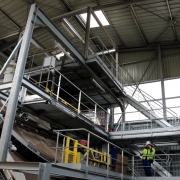Higher Climate Benefits Thanks To European Waste Management Sector
A new European study to be published in December 2021 will show that the achievement of EU recycling and landfill diversion targets by 2035 will result in a major contribution from the UK and EU Member States towards the Paris Climate Agreement.
The study highlights the causality between increased recycling (in line with EU and UK policies) and CO2 emissions reduction for the waste streams studied. Achieving the EU municipal recycling target of 65% and landfill cap of 10% will result in an annual reduction of ~150 million tonnes CO2-eq compared to 2018. This takes into account the avoided emissions from the energy and manufacturing sectors not using fossil fuels and virgin materials. The study highlights the importance of continuing to move waste up the waste hierarchy and further developing circular economy policies.
The CO2 savings that can be achieved through the use of recovered raw materials will become increasingly important in reducing resource use and achieving climate protection goals. These savings will be complemented by the recovery of energy from non-recyclable material in energy-from-waste facilities and through the production of waste-derived fuels for energy recovery. The study projects that the European waste management sector could not only become climate neutral but carbon negative, contributing not only to a clean and safe environment but also to the wider European green economy.
The decomposition of waste in landfill generates methane, a greenhouse gas indicated by the IPCC to be 86 times more potent than CO2 over a 20-year period. The EU has recently launched the Global Methane Pledge to highlight the importance of reducing methane. The study’s analysis confirmed that the largest CO2 reductions are achieved through reducing the quantities of biogenic material waste streams – including paper, cardboard and biowaste – sent to landfill. Under the study’s ambitious scenario 2 (which assumes higher recycling targets and the diversion of all recyclable and recoverable waste from landfill), CO2 emissions savings will almost double from the current 2035 trajectory and methane emissions will be avoided. The waste management sector is committed to reducing methane emissions and invites all stakeholders, including authorities, investors and civic society, to join forces to complete this transition within the upcoming 9-14 years.
Achievement of the CO2 reduction potential highlighted in this study will be possible across Europe on the provision that effort is made to further incentivise recycling capacity (including through public support for separate collection systems), set up new measures such as mandatory recycled product content, increase progress on the eco-design and recyclability of manufactured products. EU policy and taxonomy investment should focus on integral waste management to support this transition. The utilisation and sharing of energy recovery capacity across Europe is key to diverting as much waste as possible from landfill across the continent.
In order to achieve the more ambitious projections under scenario 2, the study also concludes that waste targets should be extended to industrial and commercial waste, recycling targets should be increased and waste streams suitable for recycling and recovery should be diverted from landfill. The study also acknowledges that landfill would then only be utilised exclusively for the treatment of specific waste streams such as asbestos which are unsuitable for energy recovery.
The study has been conducted by renowned research organisations, Prognos and CE Delft, on behalf of the European waste management associations FEAD, CEWEP, the RDF Industry Group, and the Dutch Waste Management Association.
The full study will be published and available in December 2021 on the websites of the industry associations.
Source: FEAD (Belgium, November 11, 2021)






